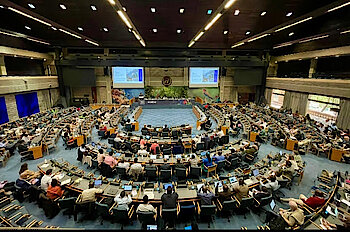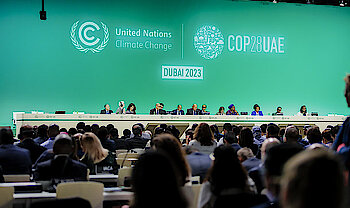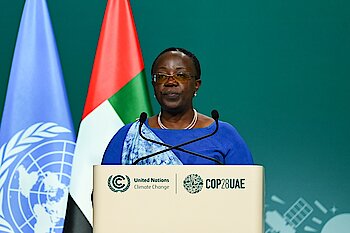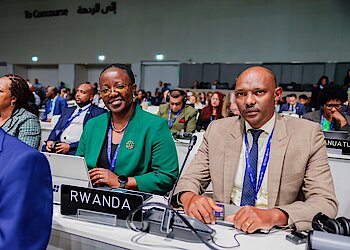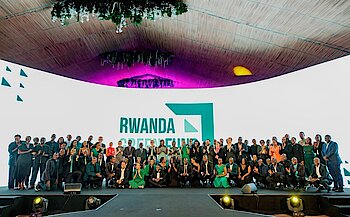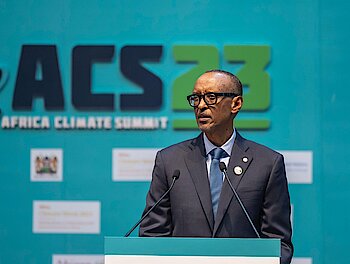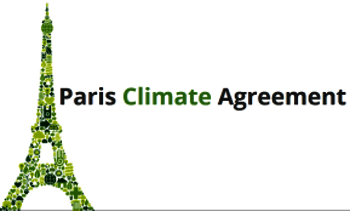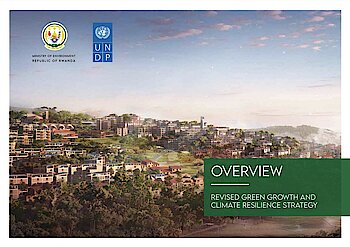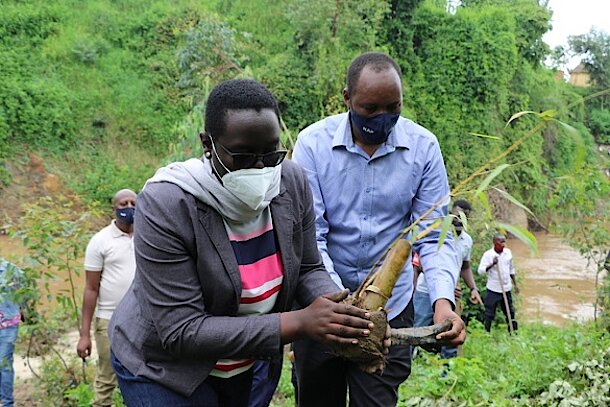
Rwanda’s NAP Project funded by GEF was launched
The Global Environment Facility (GEF)-funded $6 million project “Building the capacity of Rwanda’s government to advance the National Adaptation Planning process (NAP)” was officially launched this Saturday, 28 November 2020, in Nyagatare District, Eastern Province.
Organized by the Ministry of Environment and REMA, in collaboration with the local authorities, a special community works event (umuganda) was conducted alongside the River Umuvumba, at the border with the neighboring Uganda. About 2000 bamboo trees were planted to stabilize 3.5 km long river banks and protect adjacent farm lands in the Sector of Kagitumba
Global changes in climate are affecting Rwanda in many complex ways. These include climate related hazards such as floods, landslides and droughts as well as windstorms and severe rainstorms that have struck Rwanda in recent years with devastating effects on the population. These hazards have affected all districts and individual households across the nation – affecting the livelihoods and food security of rural and urban populations as well as the agricultural, energy, health, water, natural resource and institutional systems on which the populations depends.
The latest Assessment of Climate Change Vulnerability in Rwanda report (2019) had pointed out that Nyagatare District has the lowest adaptive capacity among the 7 districts of Eastern Province due to the lack of measures to mitigate climate change such as tree planting or construction of the drainage ditches, and in some extent the low proportion of households accessing their own land.
This four year project will increase capacity of governmental authorities and local communities in Rwanda to plan, fund, implement and monitor climate change adaptation solutions in the medium to long-term through the:
- Strengthening of technical and institutional capacity for NAP using up-to-date climate information.
- Establishment of a funding strategy for NAP in Rwanda, including pilots to inform medium- to long-term adaptation investments.
- Increase of capacity for monitoring, reviewing and knowledge sharing to learn from the NAP process in Rwanda.
In addition to Nyagatare, the project will also undertake other ecosystem based adaptation activities in the districts of Kirehe (protection of Ibanda-Makera forest), Rusizi (increasing climate resilience of Shagasha tea plantations) and Gasabo (protection and wise use of urban wetland).
This project will be implemented by Rwanda Environment Management Authority (REMA) in close collaboration with the Ministry of Environment and the authorities of the districts of Kirehe, Rusizi, Gasabo and Nyagatare. The GEF will fund the project through the UN Environment Program (UNEP), as an implementing partner.
[Image: The Minister of Environment, Dr. Jeanne d’Arc Mujawariya, addressing local communities after Umuganda]
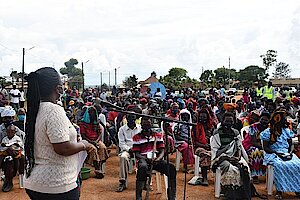
Topics
More posts
Tackling Short-Lived Climate Pollutants: Insights from CCAC2024 Conference
The Climate and Clean Air Conference 2024 (CCAC2024), took place in Nairobi, Kenya, on the sidelines of the Sixth session of the United Nations…
RWANDA WELCOMES HISTORIC COP28 DECISION TO TRANSITION AWAY FROM FOSSIL FUELS
The Government of Rwanda has welcomed the ground-breaking decision made at the 28th Conference of the Parties (COP28) to the United Nations Framework…
NATIONAL STATEMENT - COP28 UN CLIMATE CHANGE CONFERENCE
Delivered by Dr Jeanne d’Arc Mujawamariya, Minister of Environment
To begin, I express my gratitude to His Highness Sheikh Mohamed bin Zayed…
Follow the UNEP Pavilion Discussion on the Role of Industry & Finance in Supporting the Adaptation Agenda at COP28
This session, which comes at the conclusion of Industry Day is designed to offer comprehensive insights into the roles of industry and finance in…
Rwanda to call for more ambitious climate action at COP28
At this year’s UN Climate Change Conference, known as COP28, Rwanda will call for more ambitious climate action, a doubling of funding for adaptation…
Rwanda Green Fund Celebrates a Decade of Impact
The Rwanda Green Fund has marked its 10th anniversary, a remarkable milestone of transformative impact in Rwanda. Established in 2012, the Fund has…
Africa Climate Summit | National Statement by President Kagame | Nairobi, 5 September 2023
First, I wish to thank President Ruto for hosting us in beautiful and vibrant Nairobi for the Africa Climate Summit, organized in collaboration with…
Strengthening Transparency in Climate Action: Rwanda's Progress under the Enhanced Transparency Framework
Climate change is a global challenge that requires urgent action. Rwanda, like many other countries, is experiencing the impacts of climate change,…
RWANDA LAUNCHES REVISED GREEN GROWTH AND CLIMATE RESILIENCE STRATEGY
Rwanda has on June 5, 2023 launched the Revised Green Growth and Climate Resilience Strategy as part of World Environment Day celebrations. The…
